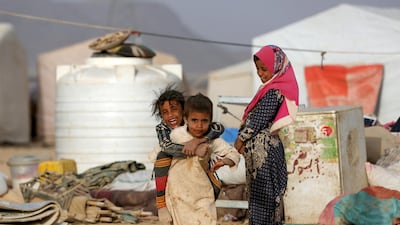The UN launched humanitarian flights to Yemen's Marib region on Tuesday, where a Houthi rebel assault on a government-held city killed dozens of civilians and forced tens of thousands from their homes.
UN spokesman Farhan Haq said the flights were possible after co-ordination with "de facto authorities" in Yemen. A schedule for the flights was being finalised.
“Today, the UN started regular humanitarian air service flights to Marib,” Mr Haq said.
Read More
Yemen will not be a platform for attacks against Saudi Arabia, Arab League says
US Yemen envoy: work needed to get Houthis 'to put down their guns'
Yemen's 'sons of the desert' fight to save homes from Houthi offensive
“This will cut the journey down to two hours from seven and will help the humanitarian community to quickly deliver much-needed assistance.”
He said the flights, which travel from Djibouti through Aden, would deliver life-saving supplies to civilians forced from their homes by “fierce fighting” in Marib.
“Nearly 20,000 people have been displaced by violence in the region since early February and dozens of civilians have been killed or injured,” Mr Haq said.
“Humanitarian organisations are on the ground responding to these growing humanitarian needs.”
The Iran-backed Houthi rebels have made gains in the battle for Marib, advancing close to the city centre at the weekend despite enduring heavy casualties.
Marib and its surrounding oilfields are the last significant pocket of government-held territory in the north. The rest is under rebel control, including the capital Sanaa.
Analysts say the Houthis are intent on capturing the city for leverage before any negotiations with the government, amid a US push to revive peace talks.
The city's fall could worsen Yemen’s humanitarian situation, as many civilians displaced from fighting elsewhere in the country have sought refuge there.
About 140 camps have sprung up in the surrounding desert to provide basic shelter for up to two million displaced people, the Yemeni government said.
Hundreds of combatants have been killed since the offensive began.
The UN's humanitarian chief, Mark Lowcock, told the Security Council on Tuesday that civilians were paying the price for the fighting.
“Air strikes and shelling have hit farms, markets, food storage sites and fishing boats,” Mr Lowcock said.
“A study last year in Yemen showed how the use of heavy explosive weapons in populated areas has disrupted every resource and system in the country, including water and power supplies, hospitals and sanitation systems.”
Yemen’s conflict has claimed 233,000 lives and pushed the country towards famine and what the UN calls the world’s worst humanitarian emergency.
Fighting began in 2014 when the Iran-aligned Houthis seized Sanaa and later ousted the internationally recognised government of President Abdrabu Mansur Hadi.
A Saudi-led coalition intervened militarily after a request from the government.
US President Joe Biden ended US support for the war and launched a diplomatic effort for a peace deal that has yet to gain traction.
The UN envoy to Yemen, Martin Griffiths, held talks in Cairo on Monday with Egyptian officials, intent on reviving the political process to end the conflict.
“Mr Griffiths stressed the need for the attack on Marib to stop,” Mr Haq said.
“He warned of the dire humanitarian consequences of the continued attack and the risks to the prospects of the peace process.”


